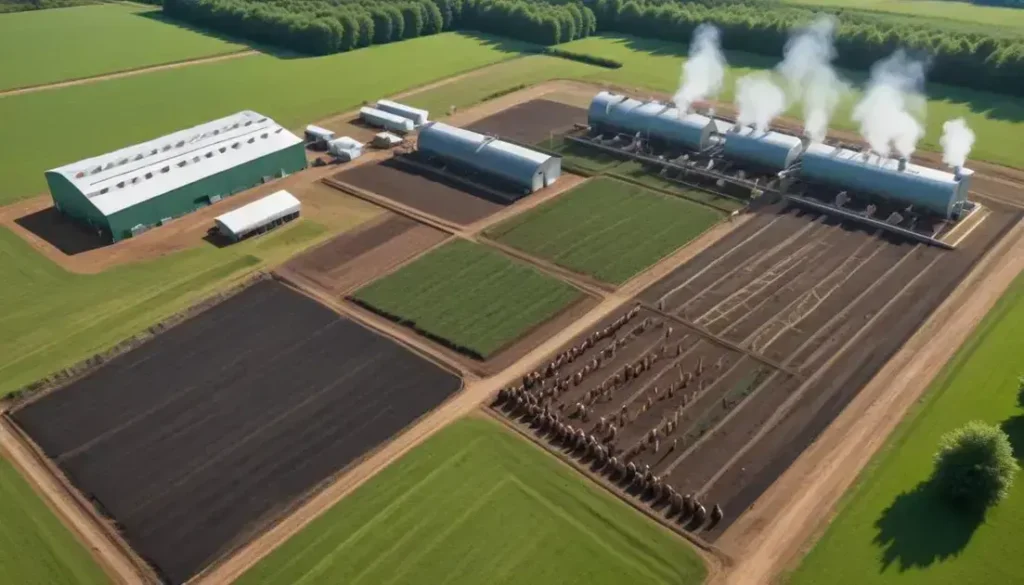Sustainability in agriculture focuses on practices that restore soil health, enhance biodiversity, and reduce environmental impacts, ensuring food security while promoting eco-friendly farming methods.
Sustainability is becoming increasingly important in the agricultural sector, and Bunge is taking strides to lead this change. How will these efforts shape the future of farming?
Introduction to Bunge’s sustainability initiatives
Bunge has made significant strides in sustainability, focusing on innovative practices that minimise environmental impacts. Their initiatives encompass reducing greenhouse gas emissions across their operations, which is crucial in addressing climate change challenges.
One of the key components of Bunge’s strategy is traceability. By implementing advanced tracking systems, they can ensure that all agricultural products sourced meet strict sustainability criteria. This transparency not only builds consumer trust but also aligns with growing regulatory demands.
Furthermore, Bunge collaborates with organisations like the World Resources Institute to enhance their sustainability efforts. Such partnerships enable them to stay ahead in developing best practices for sustainable agriculture.
Regenerative agriculture is another focus area for Bunge, aiming to improve soil health and biodiversity. These practices support long-term productivity while mitigating negative environmental impacts.
As the agricultural industry evolves, Bunge’s commitment to sustainability positions them as a leader. Their proactive approach will inspire other firms to adopt similar practices, ultimately benefiting both the environment and the economy.
Overview of emissions reductions
Bunge is committed to reducing emissions within its operations, recognising the importance of environmental responsibility. With significant investments in technology and sustainable practices, the company aims to meet its ambitious carbon reduction targets.
One key strategy involves improving energy efficiency across all facilities. By adopting renewable energy sources, Bunge demonstrates a commitment to lowering its carbon footprint while continuing production.
Furthermore, Bunge engages with local farmers to implement sustainable agricultural practices. These practices, such as cover cropping and reduced tillage, contribute to lower agricultural emissions and enhance soil health.
Monitoring and reporting play a crucial role in Bunge’s strategy. By tracking emissions meticulously, the company ensures accountability and transparency. Regular assessments help identify areas for improvement and drive continuous sustainability advancements.
Bunge also collaborates with industry bodies and governmental organisations to share insights and best practices. This collaborative approach fosters a broader understanding of emission reduction challenges and accelerates progress towards common goals in the agriculture sector.
Traceability in supply chains
Traceability within supply chains is a crucial aspect of Bunge’s sustainability initiatives. By ensuring full transparency, Bunge can track the journey of its products from farm to table. This practice not only fosters trust among consumers but also complies with increasing regulatory requirements.
Implementing advanced technologies, such as blockchain and data analytics, has greatly enhanced Bunge’s ability to monitor every step of the supply chain. These technologies provide real-time data, allowing for quick identification of issues and ensuring quality control throughout the process.
Moreover, traceability enables Bunge to support local farmers by verifying that sustainable practices are being implemented. This assurance encourages continuous improvement and helps promote environmentally friendly agriculture.
Engaging with stakeholders is vital for the success of traceability initiatives. Bunge collaborates with suppliers, customers, and technology partners to refine and optimise its systems. This collaborative effort not only improves supply chain efficiency but also strengthens the sustainability credentials of the entire system.
In addition, the emphasis on traceability allows Bunge to respond to consumer demands effectively. With increasing public interest in the origins of food, Bunge’s commitment to traceability adds value and differentiates its offerings in a competitive market.
Global impact of sustainable agriculture
The global impact of sustainable agriculture extends far beyond local communities, influencing environmental health and economic stability worldwide. Sustainable farming practices not only aim to enhance food production but also focus on preserving natural resources and maintaining biodiversity.
By adopting sustainable methods, farmers can reduce reliance on chemical fertilizers and pesticides, leading to healthier ecosystems. This shift mitigates soil degradation and promotes crop resilience against climate change, which is crucial in today’s environment.
Moreover, sustainable agriculture supports local economies by creating jobs and enhancing food security. It empowers farmers through knowledge and resources to implement eco-friendly practices, thus fostering community development.
On a broader scale, sustainable agriculture contributes to the global fight against hunger. By improving the efficiency of food production while ensuring ecological balance, it ensures that future generations have access to sufficient and nutritious food.
Additionally, the adoption of these practices globally can significantly lower greenhouse gas emissions, playing a vital role in combating climate change. The collaboration between governments, NGOs, and private sectors is essential in promoting sustainable agricultural practices worldwide, ensuring a sustainable future for our planet.
Collaboration with World Resources Institute
Bunge’s collaboration with the World Resources Institute (WRI) represents a significant step towards enhancing sustainability in agriculture. This partnership focuses on implementing innovative strategies to address critical environmental challenges while promoting responsible resource management.
Through this collaboration, Bunge gains access to cutting-edge research and data-driven insights that help inform its sustainability initiatives. By aligning with WRI’s expertise, Bunge can enhance its practices, particularly in areas like land use and climate resilience.
One noteworthy aspect of this partnership is the emphasis on sustainable supply chains. Bunge leverages WRI’s methodologies to ensure that agricultural practices are both productive and environmentally friendly. This includes efforts to reduce deforestation and enhance biodiversity while meeting global food demands.
Moreover, the collaboration facilitates stakeholder engagement. Bunge and WRI work together to bring various players in the agriculture sector to the table, encouraging dialogue and shared goals. Such collaborative efforts are essential for driving impactful change across the industry.
This partnership not only underscores Bunge’s commitment to sustainability but also sets a precedent for other organisations. By demonstrating the benefits of working with experts like WRI, Bunge paves the way for a more sustainable future in agriculture.
The importance of regenerative agriculture
Regenerative agriculture is crucial for sustainable farming practices, as it focuses on restoring and enhancing the health of ecosystems. This holistic approach goes beyond mere sustainability by aiming to improve soil fertility, increase biodiversity, and enhance water retention.
One of the primary benefits of regenerative agriculture is its ability to sequester carbon in the soil. By implementing practices such as cover cropping, reduced tillage, and crop rotation, farmers can significantly reduce carbon emissions while improving soil health. This is essential in the fight against climate change.
Moreover, regenerative agriculture promotes diverse crop rotations, which contribute to soil resilience and protect against pests and diseases. This diversity not only improves yields but also supports local food systems and the economy.
Farmers practising regenerative methods often see enhanced productivity and profitability. This is achieved through reduced input costs, improved soil health, and increased ecosystem services, such as enhanced pollination and natural pest control.
Furthermore, regenerative agriculture fosters a deep connection between farmers and the land. It encourages a long-term view of farming where the focus is not solely on immediate profits but also on the health of the entire ecosystem for future generations.
Future outlook for sustainability in agriculture
The future outlook for sustainability in agriculture appears promising as awareness of environmental impacts continues to grow. Innovations in technology, such as precision farming and artificial intelligence, will play a crucial role in optimising resource use and maximising crop yields.
Farmers are increasingly adopting sustainable practices that not only enhance productivity but also conserve biodiversity and protect natural resources. Techniques like vertical farming, hydroponics, and aquaponics are gaining traction, allowing for food production in urban settings with minimal environmental footprints.
Moreover, consumers are becoming more conscious of their food choices, demanding transparency regarding sourcing and sustainability. This shift forces agricultural producers to adopt environmentally friendly practices to retain market share and build consumer trust.
Government policies are also evolving to support sustainable agriculture initiatives. With incentives for farmers to implement eco-friendly practices, there is a clear path towards a greener future in the agricultural sector.
Collaboration between industry players, researchers, and policymakers will be paramount in addressing challenges and sharing best practices. By harnessing collective knowledge and resources, the agricultural sector can progress toward a sustainable future that meets the needs of both people and the planet.
In conclusion: The Path to Sustainable Agriculture
Embracing sustainability in agriculture is crucial for the health of our planet and future food security. By adopting innovative practices like regenerative agriculture, traceability, and collaboration with organisations like the World Resources Institute, farmers can make a significant impact.
As consumers become more aware of their food choices and demand transparency, it is essential for agricultural producers to adapt. The integration of sustainable methods not only benefits the environment but also enhances economic opportunities within the farming sector.
Looking ahead, the agricultural industry has the chance to lead in sustainability, leveraging technology and community partnerships to create a resilient food system. Together, we can ensure that agriculture not only meets today’s needs but also safeguards our environment for generations to come.
Frequently Asked Questions
What is regenerative agriculture?
Regenerative agriculture is a farming approach that focuses on restoring soil health, increasing biodiversity, and enhancing ecosystems while producing food sustainably.
How does sustainability in agriculture benefit the environment?
Sustainable agriculture helps reduce pollution, conserve water, and improve soil health, contributing to a cleaner and more resilient environment.
Why is traceability important in the supply chain?
Traceability ensures transparency, allowing consumers to understand where their food comes from and how it is produced, which builds trust and promotes responsible practices.
What role does technology play in sustainable agriculture?
Technology, such as precision farming and AI, optimises resource use and improves crop management, leading to more efficient and sustainable farming practices.
How can consumers support sustainable agriculture?
Consumers can support sustainable agriculture by choosing to buy products from farmers who use eco-friendly practices and by demanding transparency in food sourcing.
What is the future outlook for agriculture sustainability?
The future of sustainable agriculture looks promising, with increasing adoption of innovative practices and greater consumer demand for eco-friendly food options, helping to create a resilient food system.


